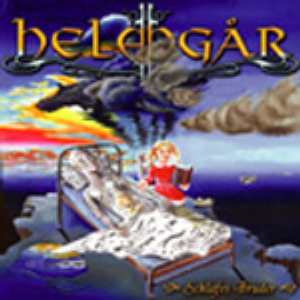
2006-05-11
This former six-piece (meaning they were a six-piece band until not so long ago, and are now a four-piece) band from Germany decided to go for a conceptual album, revolving around the 1995 novel “Schlafes Bruder” (meaning: Brothers of sleep) by Robert Schneider; the novel (which was even made into a movie back in 1996) touches question about God, Love and History through a fiction story about the incredible life of Johannes Elias Alder, a man in a small 19th Century Austrian village who was given the gift of hearing and mimicking every existing sound, which had the potential of becoming the greatest composer ever.
Helangår send us on a journey from the very first moments of this album (being their second album, after 2003’s “Evening in Valhalla” got them some recognition by Folk-metal lovers) with the title track setting a high bar of classical/folk influenced writing but a rather low bar in terms of sound and production; nevertheless, it sets a well-written dramatic tone.
It is quite evident that this is a self produced album, driven by a need to create but a strong will no to be corrupted by the market, since the acoustic and clean instrument segments sound good while the drums and distorted/heavy/grunted parts don’t.
A medieval feeling is introduced in “Praeludium” along with a narrated voice, and we are slowly entering “Geburt-Des Lebens Lied”; a track which is full of potential, combines both male and female clean with (tormented) growled vocals and even goes into a black metal originated part as well as an emotional finish – the structure is brilliant but clearly suffers from the poor sound.
The same line carries on in “Das wunder seines Hörens”, jumping from part to part; starting in a way which reminded me of Dream Theater’s openings somehow, continuing with a mysterious tone and becomes highly energetic all of the sudden – truly exhausting, like watching LOTR.
The medieval ages return in “Die Gadenzeit”, but not in such a good manner… the female vocalist tries too hard to sound powerful so it doesn’t come off very well.
“Herzens' Sturm”, the follower, is the calm before the storm; a time to lick our wounds from previous battles and prepare for the blazing storm ahead – “Mitternacht” – the strongest track here.
The romantic “In Wehmut” is yet another intro, this time to the epic; an almost 21 minute long track titled “Dämmerung”. This track is divided into five parts and is really the utter highlight of this album.
I’m not sure if this album is meant to be a tribute to the story, an invitation to read the book or the band’s way of saying “this is our way of telling story” – what I do know (and don’t mind repeating) is that with good quality sound/production this could have been a masterpiece.
Ofer Vayner
